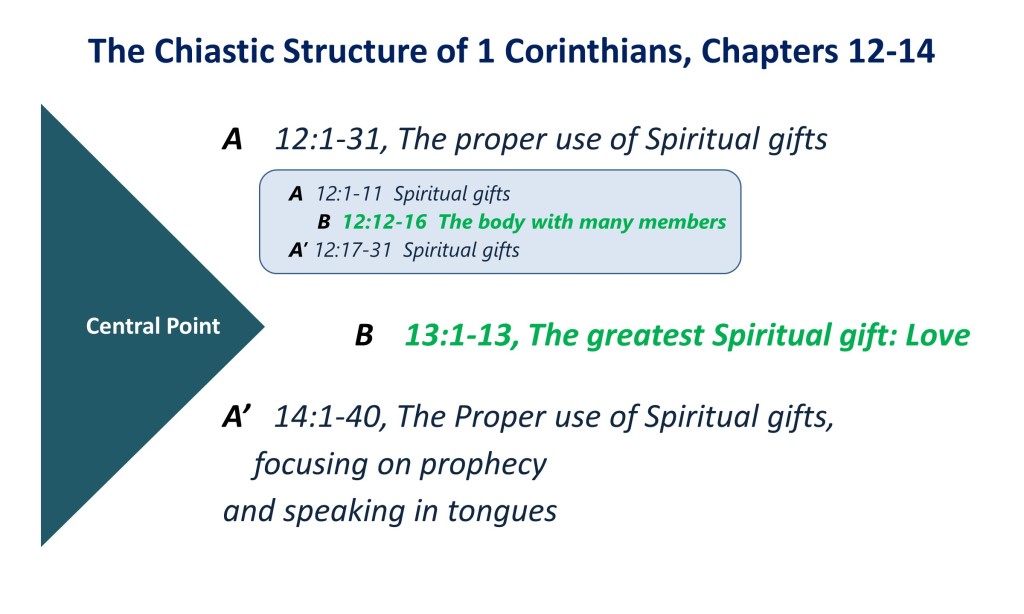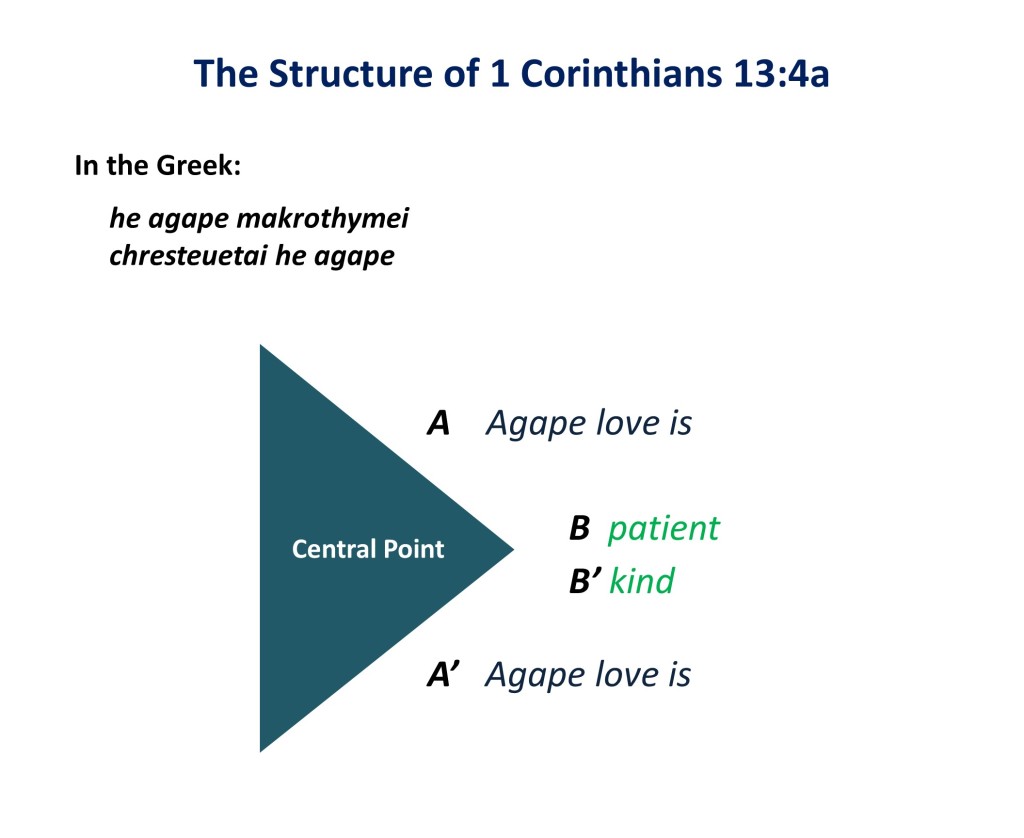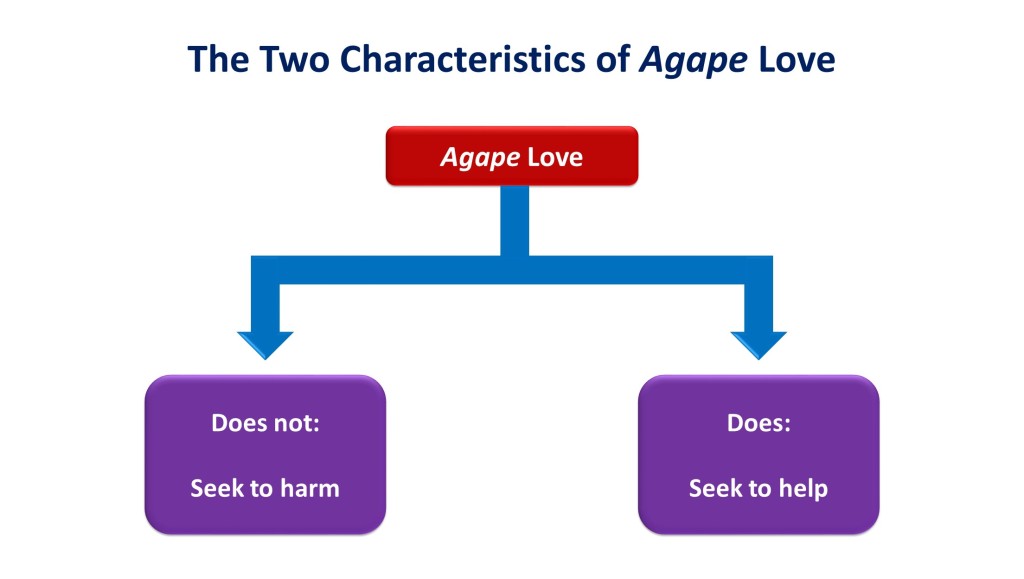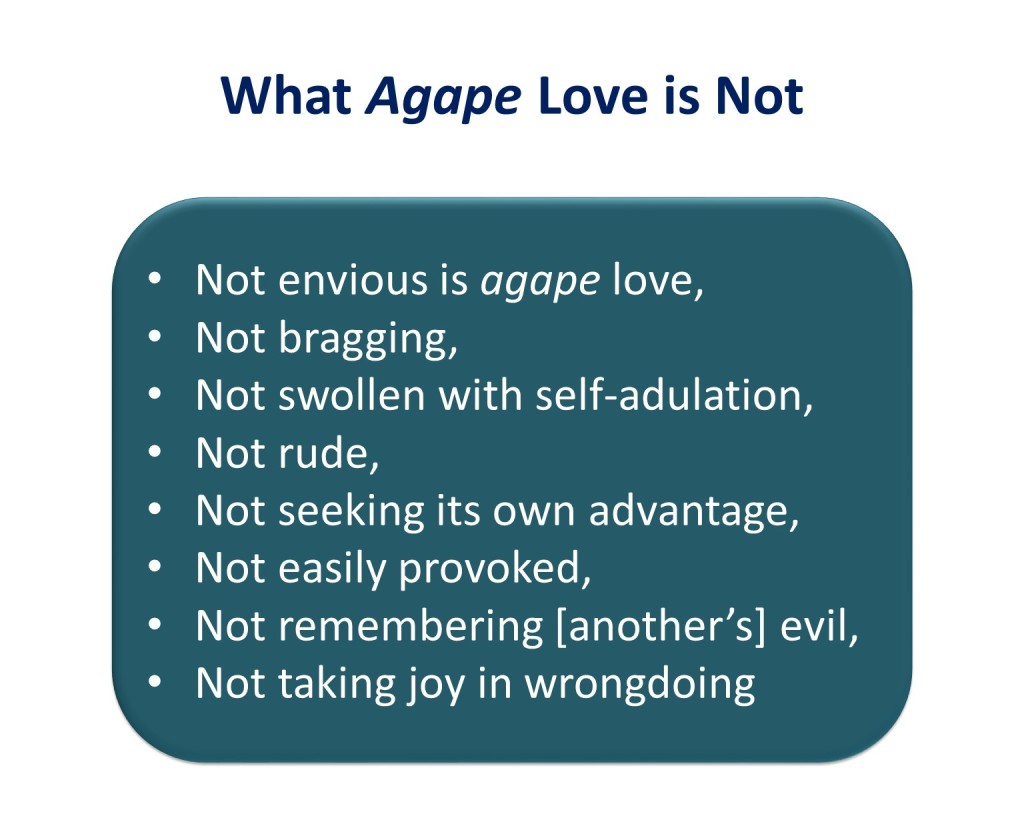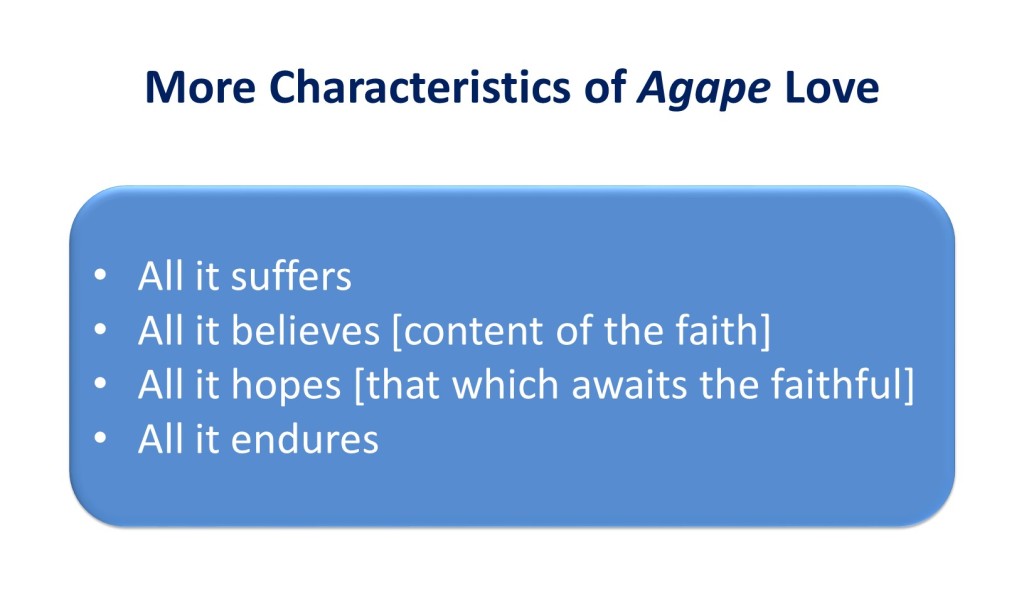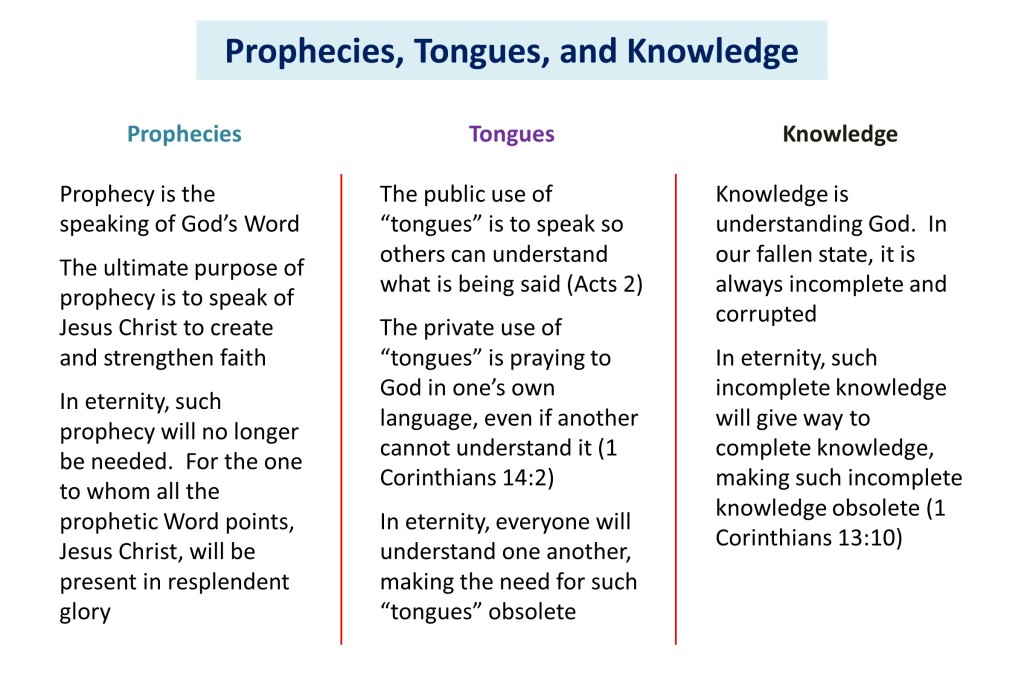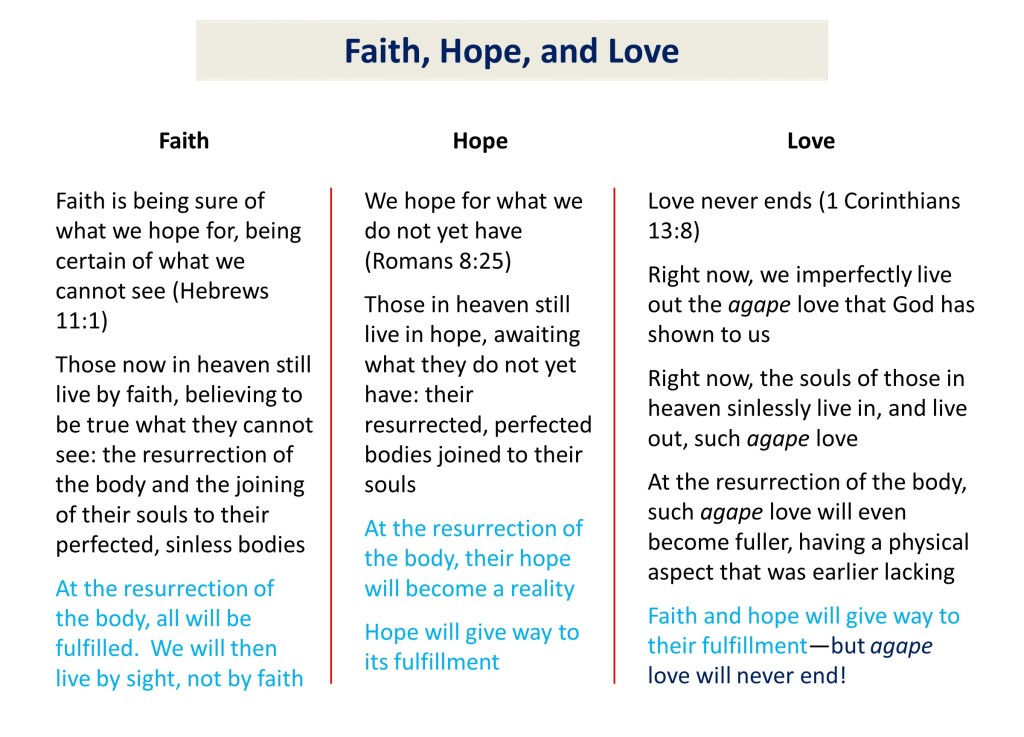 Having dealt with those who were misusing spiritual gifts (or doing what they thought were expressions of their spiritual gifts, but were not), Paul now moves to his main train of thought. He finished chapter 12 with these words: “And now I will show you the best way of all” (1 Corinthians 12:31). 1 Corinthians 13 is this “best way of all.” It is also the central point that Paul makes on using spiritual gifts.
Having dealt with those who were misusing spiritual gifts (or doing what they thought were expressions of their spiritual gifts, but were not), Paul now moves to his main train of thought. He finished chapter 12 with these words: “And now I will show you the best way of all” (1 Corinthians 12:31). 1 Corinthians 13 is this “best way of all.” It is also the central point that Paul makes on using spiritual gifts.
Love is Essential
Greek words for “love”:
- Eros: romantic or sexual love.
- Philia: a friendship type of love. Philadelphia means the “city of brotherly love.”
- Storge: parental love.
- Agape: In this chapter, Paul only uses agape for “love.” Agape is a fully benevolent, unselfish love, which does not seek any reward or return. Instead, agape’s focus is on how it benefits the other. The New Testament primarily uses agape to describe for God’s love for us, which Jesus lives out in giving of Himself for us on the cross. This “love of God has been poured into our hearts through the Holy Spirit, who has been given to us” (Romans 5:5). God’s selfless and perfect love shown to us also produces love for God in return (Romans 8:28; 1 Corinthians 2:9).
Read 1 Corinthians 13:1
- What problem does Paul deal with right at the outset of this chapter?
“speak in a tongue”: A Hebrew and Aramaic expression referring to speaking or reading in another language. The Old Testament uses this expression in Deuteronomy 28:49; Nehemiah 13:24; Esther 1:22; Isaiah 28:11, 33:19; and Jeremiah 5:15.
“tongues of angels”: Jewish Rabbis considered Hebrew as the proper language for prayer. Hebrew was also the language of the Temple liturgy, even though most Jews in Judea only spoke Aramaic and/or Greek. Hebrew was also considered the holy or heavenly language that the angels spoke.
“noisy gong”: literally, “noisy bronze.” This does not refer to a musical instrument or a sound with a musical quality, but the sound of clashing and clanging metal.
“clanging cymbals”: metal basins used like our modern cymbals. Pagan worship in Corinth used cymbals to worship Cybele, Dionysius, and Corybantes.
- What does Paul imply about the improper use of languages/tongues during Christian worship?
Read 1 Corinthians 13:2
Matthew 17:20: [Jesus speaking to His disciples:] “If you have faith the size of a mustard seed, you can say to this mountain, ‘Move from here to there,’ and it will move.” (See also Matthew 21:21 and Mark 11:23).
- What does prophecy, revealing your understanding of mysteries and knowledge, and faith to move mountains all entail?
- How do verses 1 and 2 differ in focus?
Read 1 Corinthians 13:3
- If verses 1-2 focused on what one says, what does verse 3 focus on?
- Thus, what happens if love is lacking in what one says and does?
- What extremes does Paul contrast with what one does and the result of it if love is lacking?
Love’s character and what it does
Paul (with Sosthenes’ help?) now focuses on the character of love, using poetry and rhetoric for maximum effect. It’s worth noting that all the descriptions of love are verbs in the Greek, not adjectives.
After stating that, without love, even the greatest deeds are nothing, Paul now uses a mini chiasm to emphasize that the character of love is in what it selflessly does. An expressionless love is not love.
“patient”: to endure with forbearance. Thus, agape love endures what is bad and does not lash out in response to harm another.
“kind”: an active verb, seeking the good of others.
Thus, we learn that—not only is the character of love outward, not inward—but agape loves expresses itself in two main ways.
After showing how agape love expresses itself, Paul now lists what love is not. He does this through a series of 8 statements, all beginning with the Greek word for “no.”
- Contrast these characteristics with agape love.
- Based on what Paul uses to show what love is not, consider these negative traits with how Paul had earlier described the behavior of the Corinthians Christians.
After using a series of 8 examples of what love is not, Paul now employs “antithetical parallelism,” contrasting false love with real love.
Read 1 Corinthians 13:6b
- Instead of doing what Paul had listed, or taking delight in wrongdoing, what does agape love do?
“truth”: We tend to view truth as abstract facts, something correct when it comes to knowledge or understanding. Here, Paul contrasts “truth” against unrighteousness or wrongdoing. For Paul, truth is not just knowing the right stuff, it’s also living it.
In finishing this section on the character of agape love, Paul again uses repetition. He lists a series of traits, all beginning with the Greek word for “all.”
Love never falls
Read 1 Corinthians 13:8-12
- Paul has been dealing with the Corinthian Christians misusing what they considered to be their spiritual gifts. Concerning such gifts, what will happen to them in eternity?
- We “now we see in a mirror dimly.” What does that mean about our life right now?
- Because we “see dimly,” what does that mean about our need for spiritual gifts?
- Seeing “face to face” is Paul’s way of describing what aspect of eternal life?
- Thus, when will we “know fully” and when will we be “fully known”?
Read 1 Corinthians 13:13
When Paul wrote that we will see “face to face,” he was pointing to the reality of eternal life after the resurrection of the body. Then, we will “not know in part,” for we will be all that God originally created us to be, confirmed in sinless perfection. Then we will “know fully” and all can fully know us because we will then be fully complete.
- What is even greater than faith and hope?
- Why?
